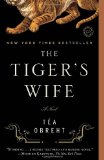Summary | Excerpt | Reviews | Beyond the book | Read-Alikes | Genres & Themes | Author Bio

A Novel
by Téa ObrehtWeaving a brilliant latticework of family legend, loss, and love, Téa Obreht, the youngest of The New Yorker’s twenty best American fiction writers under forty, has spun a timeless novel that will establish her as one of the most vibrant, original authors of her generation.
Winner of the 2011 Orange Prize for Fiction
In a Balkan country mending from years of conflict, Natalia, a young doctor, arrives on a mission of mercy at an orphanage by the sea. By the time she and her lifelong friend Zóra begin to inoculate the children there, she feels age-old superstitions and secrets gathering everywhere around her. Secrets her outwardly cheerful hosts have chosen not to tell her. Secrets involving the strange family digging for something in the surrounding vineyards. Secrets hidden in the landscape itself.
But Natalia is also confronting a private, hurtful mystery of her own: the inexplicable circumstances surrounding her beloved grandfather’s recent death. After telling her grandmother that he was on his way to meet Natalia, he instead set off for a ramshackle settlement none of their family had ever heard of and died there alone. A famed physician, her grandfather must have known that he was too ill to travel. Why he left home becomes a riddle Natalia is compelled to unravel.
Grief struck and searching for clues to her grandfather’s final state of mind, she turns to the stories he told her when she was a child. On their weeklytrips to the zoo he would read to her from a worn copy of Rudyard Kipling’s The Jungle Book, which he carried with him everywhere; later, he told her stories of his own encounters over many years with “the deathless man,” a vagabond who claimed to be immortal and appeared never to age. But the most extraordinary story of all is the one her grandfather never told her, the one Natalia must discover for herself. One winter during the Second World War, his childhood village was snowbound, cut off even from the encroaching German invaders but haunted by another, fierce presence: a tiger who comes ever closer under cover of darkness. “These stories,” Natalia comes to understand, “run like secret rivers through all the other stories” of her grandfather’s life. And it is ultimately within these rich, luminous narratives that she will find the answer she is looking for.
Winner of the 2011 Orange Prize for Fiction
The Tiger's Wife is, on the surface, a tale of one woman's search for the truth behind her beloved grandfather's death, but the implications of this search are fundamental to the way we make sense of life and death. Obreht's delicate unfolding of Natalia's grandfather's past presents a multi-dimensional view of a man Natalia believed she knew. From the reader's view, these different perspectives are suspended but never resolved, so that we are left with the final, breathless conclusion that they could all be true. The tantalizing notion that the fantastic and unbelievable can co-exist with the mundane has long fueled religion, fiction, and folklore. Obreht teases out the human impulse to create stories, to contrive wonder in the face of temporality, and the result is extraordinary...continued
Full Review
 (730 words)
(730 words)
(Reviewed by Sarah Sacha Dollacker).
The Tiger's Wife comes out of the magical realism tradition. Like the technique itself, the definition of magical realism is difficult to pin down, but most critics agree that it is a literary mode that "seizes the paradox of the union of opposites." In this way, writers are able to hold, as Obreht does, the real and the fantastic together so that both paradoxical elements are accepted in the same thought.
Though the idea of magical realism was originated in 1920s Germany by Franz Roh to describe post-expressionist art, the term lo real maravillso (magical realism), as applied to literature came out of Latin America in the late 1940s. The first writers to find literary success with this mode were Argentinian Jorge Luis ...

If you liked The Tiger's Wife, try these:

by Isabel Allende
Published 2018
New York Times and worldwide bestselling "dazzling storyteller" (Associated Press) Isabel Allende returns with a sweeping novel about three very different people who are brought together in a mesmerizing story that journeys from present-day Brooklyn to Guatemala in the recent past to 1970s Chile and Brazil.

by Sara Novic
Published 2016
A powerful debut novel about a girl's coming of age—and how her sense of family, friendship, love, and belonging is profoundly shaped by war.